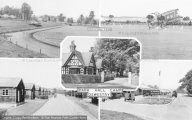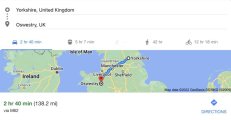David Piper
Dedicated Member
(S03 E01) The Man From Oswestry
Original Airdate: October 27, 1976
Cyril has left and taken up with a Welsh widow woman. He writes to Clegg and Compo, requesting they welcome their returning schoolmate, Foggy Dewhurst.
“You get depressed sometimes and begin to believe there aren’t any real, old-fashioned idiots left! And then, out of the blue, comes a genuine, fourteen-karat, gilt-edged barmpot like this!”
~Norman Clegg
It’s been a year and a half since the end of Series 2.
Bill Owen employs brilliant body language in the opening, dragging himself through the empty streets before dawn like a truant schoolboy who doesn’t know what to do with his newfound spare time. Though for a scruffy herbert, Compo’s trademark jacket looks rather well tailored!
Cyril’s departure has gutted Compo. The cafe isn’t even open yet, which begs the question: Has Compo been wandering around all night? Compo commiserates with Sid, who fires a broadside at the Labour Party, reflecting the United Kingdom’s tumultuous 1970s disillusionment.
Cyril and Foggy were stationed together in Oswestry for "several months in 1947."
Ivy is not in this episode. Nora Batty is also absent.
Norman Clegg, Holmfirth’s resident flat-cap philosopher, is listless and morose. Such is his state of mind that he’s been reduced to making perfunctory remarks regarding the state of his oil-stained trousers.
Cyril Blamire, now in Oswestry, happened into Foggy Dewhurst, who was set to be demobbed. The trio know Foggy from their school days though it doesn’t appear that the four were close friends, so perhaps Dewhurst was one of their many childhood schoolmates.
There can never be enough praise for Brian Wilde’s performance. One feels immediate sympathy for Foggy, who is, like Blamire before him, back in his hometown and redundant. No wonder Cyril wrote that epic letter to Clegg, as Blamire no doubt sympathizes with Foggy’s new circumstances and wants their old schoolmate to be looked after. Cyril's letter was so well written and consistent with his character that it was tempting to include it here in its entirety. Sallis' reading of the letter is excellent.
It’s sad the way that Foggy clutches the pathetic remnants of his military career in which he served as a mere sign painter. Foggy had pride in his craft. It's no wonder he is so protective of the 2 large duffle bags and massive foot locker which hold his every possession.
Big Malcolm (Paul Luty) is Compo’s cousin. Big Malcolm quickly puts Foggy away in their fisticuffs outside the pub, but it’s obvious that Malcolm has sized-up Foggy’s threat level, as it takes just a single tap to stop Foggy in his tracks. Big Malcolm says, “If you can keep him alive, you might get some mileage out of him!” Even the fellow who administers a beating can see that Foggy will fit in just fine.
Foggy, for all his devotion to his military colors, sure suffers for them.
Clegg mentions the Sex Discrimination Act of 1975:
“The Sex Discrimination Act 1975 (c. 65) was an Act of the Parliament of the United Kingdom which protected men and women from discrimination on the grounds of sex or marital status. The Act concerned employment, training, education, harassment, the provision of goods and services, and the disposal of premises.” [Wikipedia]
Not only does one lament Blamire’s departure–and the real-life health troubles that befell Michael Bates–but also Foggy’s introduction, which is at times positively heartbreaking. So much of that vulnerability is courtesy of Brian Wilde’s brilliant performance. The viewer meets Foggy at what is the low point in his life, compounded by the fact that Foggy wasn’t exactly leaving a grand and glorious life behind him, but it was all he had.
Foggy fights back against those who would dishonor him, but his resistance is an ineffectual one. Everyone from the agitated bus conductors to the barmaid (Paula Tilbrook; Emmerdale Farm) to Big Malcolm show little respect for Foggy. The audience titters when Foggy goes into one of his “thousand-yard stares”, but there’s little to laugh about for the majority of its 30 minutes. That is, until the hilarious–and cathartic– scene in the last act, and boy, did this viewer need it.
The well-directed (by Sydney Lotterby) sequence of Foggy running helplessly behind the cart while attached to it with his scarf is a much-needed respite from the melancholy atmosphere and even then the viewer feels for the poor fellow. Clegg and Compo follow behind, laughing not so much at Foggy’s predicament, but rather out of the relief that they once again have a “third man.”
The Man From Oswestry is a great episode, though not for comedic reasons. The episode is steeped in sadness, and the laughs are few and far between. The episode shows that Compo and Clegg are essentially grief stricken at Cyril having left, but Foggy's calamitous, sad, and ultimately hilarious arrival has lifted them out of their doldrums and up into the gleeful mischief that embodies the best of Last of the Summer Wine.
"When I had to be written out of the series because of this damned leg, in the first programme they read a letter supposed to be from me, and introducing Foggy. I must admit that when I saw the programme and heard the letter, I had tears in my eyes."
~Michael Bates
My Rating: 10/10
Original Airdate: October 27, 1976
Cyril has left and taken up with a Welsh widow woman. He writes to Clegg and Compo, requesting they welcome their returning schoolmate, Foggy Dewhurst.
“You get depressed sometimes and begin to believe there aren’t any real, old-fashioned idiots left! And then, out of the blue, comes a genuine, fourteen-karat, gilt-edged barmpot like this!”
~Norman Clegg
It’s been a year and a half since the end of Series 2.
Bill Owen employs brilliant body language in the opening, dragging himself through the empty streets before dawn like a truant schoolboy who doesn’t know what to do with his newfound spare time. Though for a scruffy herbert, Compo’s trademark jacket looks rather well tailored!
Cyril’s departure has gutted Compo. The cafe isn’t even open yet, which begs the question: Has Compo been wandering around all night? Compo commiserates with Sid, who fires a broadside at the Labour Party, reflecting the United Kingdom’s tumultuous 1970s disillusionment.
Cyril and Foggy were stationed together in Oswestry for "several months in 1947."
Ivy is not in this episode. Nora Batty is also absent.
Norman Clegg, Holmfirth’s resident flat-cap philosopher, is listless and morose. Such is his state of mind that he’s been reduced to making perfunctory remarks regarding the state of his oil-stained trousers.
Cyril Blamire, now in Oswestry, happened into Foggy Dewhurst, who was set to be demobbed. The trio know Foggy from their school days though it doesn’t appear that the four were close friends, so perhaps Dewhurst was one of their many childhood schoolmates.
There can never be enough praise for Brian Wilde’s performance. One feels immediate sympathy for Foggy, who is, like Blamire before him, back in his hometown and redundant. No wonder Cyril wrote that epic letter to Clegg, as Blamire no doubt sympathizes with Foggy’s new circumstances and wants their old schoolmate to be looked after. Cyril's letter was so well written and consistent with his character that it was tempting to include it here in its entirety. Sallis' reading of the letter is excellent.
It’s sad the way that Foggy clutches the pathetic remnants of his military career in which he served as a mere sign painter. Foggy had pride in his craft. It's no wonder he is so protective of the 2 large duffle bags and massive foot locker which hold his every possession.
Big Malcolm (Paul Luty) is Compo’s cousin. Big Malcolm quickly puts Foggy away in their fisticuffs outside the pub, but it’s obvious that Malcolm has sized-up Foggy’s threat level, as it takes just a single tap to stop Foggy in his tracks. Big Malcolm says, “If you can keep him alive, you might get some mileage out of him!” Even the fellow who administers a beating can see that Foggy will fit in just fine.
Foggy, for all his devotion to his military colors, sure suffers for them.
Clegg mentions the Sex Discrimination Act of 1975:
“The Sex Discrimination Act 1975 (c. 65) was an Act of the Parliament of the United Kingdom which protected men and women from discrimination on the grounds of sex or marital status. The Act concerned employment, training, education, harassment, the provision of goods and services, and the disposal of premises.” [Wikipedia]
Not only does one lament Blamire’s departure–and the real-life health troubles that befell Michael Bates–but also Foggy’s introduction, which is at times positively heartbreaking. So much of that vulnerability is courtesy of Brian Wilde’s brilliant performance. The viewer meets Foggy at what is the low point in his life, compounded by the fact that Foggy wasn’t exactly leaving a grand and glorious life behind him, but it was all he had.
Foggy fights back against those who would dishonor him, but his resistance is an ineffectual one. Everyone from the agitated bus conductors to the barmaid (Paula Tilbrook; Emmerdale Farm) to Big Malcolm show little respect for Foggy. The audience titters when Foggy goes into one of his “thousand-yard stares”, but there’s little to laugh about for the majority of its 30 minutes. That is, until the hilarious–and cathartic– scene in the last act, and boy, did this viewer need it.
The well-directed (by Sydney Lotterby) sequence of Foggy running helplessly behind the cart while attached to it with his scarf is a much-needed respite from the melancholy atmosphere and even then the viewer feels for the poor fellow. Clegg and Compo follow behind, laughing not so much at Foggy’s predicament, but rather out of the relief that they once again have a “third man.”
The Man From Oswestry is a great episode, though not for comedic reasons. The episode is steeped in sadness, and the laughs are few and far between. The episode shows that Compo and Clegg are essentially grief stricken at Cyril having left, but Foggy's calamitous, sad, and ultimately hilarious arrival has lifted them out of their doldrums and up into the gleeful mischief that embodies the best of Last of the Summer Wine.
"When I had to be written out of the series because of this damned leg, in the first programme they read a letter supposed to be from me, and introducing Foggy. I must admit that when I saw the programme and heard the letter, I had tears in my eyes."
~Michael Bates
My Rating: 10/10
Last edited:






 . Hope there are multiple Hertford's in the UK. First to pop up is near London, a fair bit away.
. Hope there are multiple Hertford's in the UK. First to pop up is near London, a fair bit away.

